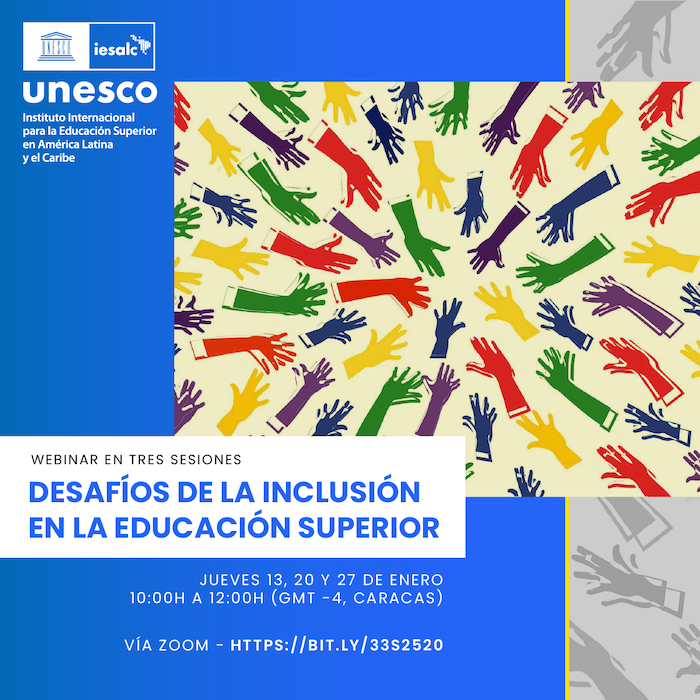
- This event has passed.
Series of three webinars on challenges of inclusion in higher education | First webinar
13 January, 2022 hora: 10:00 am - 12:00 pm

UNESCO IESALC will hold a cycle of three webinars on inclusion challenges in higher education. Its purpose is to promote analysis and shared reflection on the transformations that university institutions must undergo in order to achieve the Sustainable Development Goal 4 of the 2030 Agenda: Ensure inclusive and equitable quality education, and promote lifelong learning opportunities for all.
In the webinars, experts and interested groups will identify the main barriers, challenges and opportunities in Latin America and the Caribbean in terms of university inclusion. They will also share significant experiences, such as good practices for overcoming the challenges that inclusion presents as a continuous process linked to access, learning and participation of all social groups in equal opportunities.
The webinars will be held on Thursday, January 13, 20 and 27 from 10:00 to 12:00 (GMT -4, Caracas) in Spanish through the Zoom platform.
To register for any of the three webinars, access the following link: https://unesco-org.zoom.us/webinar/register/WN_88YxX6o4SkCelKazG8XN8Q
1st session
| Thursday, January 13, 2022 | |
| 10:00 – 10:05 | Welcome and methodological indication of the session |
| 10:05 – 10:15 | Validity of the topic about inclusion … Leave no one behind
Francesc Pedró, UNESCO IESALC director |
| 10:15 – 10:30 | Conceptual approach to Inclusion in Higher Education
Carmen Márquez Vázquez, Universidad Autónoma de Madrid, Spain |
| Equitable access dimension | |
| 10:30 – 10:45 | Policies for access to higher education in Argentina
Daniela Vanesa Perrotta. Universidad de Buenos Aires, Argentina |
| 10:45 – 11:00 | Access to higher education for Afro-Peruvians
Carlos Martín Benavides. Pontificia Universidad Católica del Perú, Peru |
| 11:00 – 11:15 | Indigenous students at universities in southwestern Colombia
Sandra Liliana Londoño Calero. Pontificia Universidad Javeriana de Cali, Colombia |
| 11:15 – 11:30 | Students with disabilities in Latin America
Marcela Méndez, Latin American and Caribbean Interuniversity Network on Disability and Human Rights (Red Interuniversitaria Latinoamericana y del Caribe sobre Discapacidad y Derechos Humanos) |
| 11:30 – 11:45 | Indigenous peoples and their inclusion in higher education
Rita Gomes do Nascimento, coordinator of the Program on Education and Ethnic-Racial Diversity, FLACSO, Brazil |
| 11:45 – 11:50 | Special intervention: Experience of university access and transition programs in Chile
Maribel Mora Curriao, director of the Office of Equity and Inclusion of the University of Chile |
| 11:50 – 12:00 | Questions and closing |
..
2nd session
| Thursday, January 20, 2022 | |
| 10:00 – 10:05 | Welcome and methodological indication of the session |
| 10:05 – 10:15 | Validity of the topic about inclusion … Leave no one behind
Francesc Pedró, UNESCO IESALC director |
| 10:15 – 10:30 | Conceptual approach to Inclusion in Higher Education
Carmen Márquez Vázquez, Universidad Autónoma de Madrid, Spain |
| Learning dimension and inclusive pedagogies | |
| 10:30 – 10:45 | The pedagogical dimension of inclusion
Marisol Silva Laya, Director of Research, Universidad Iberoamericana, Mexico |
| 10:45 – 11:00 | Postgraduate teacher training
Cynthia Duk Homad, director of the Center for Development and Innovation in Inclusive Education. Universidad Central de Chile, Chile |
| 11:00 – 11:15 | Inclusive hybrid training
Luz Osorio, director of Conecta-TE. Universidad de los Andes, Colombia |
| 11:15 – 11:30 | Curricular training in inclusion
Julieta Yadira Islas Limón, director of the Faculty of Medicine and Psychology, Universidad Autónoma Baja California, Mexico |
| 11:30 – 11:45 | Experience of University Inclusion (undergraduate level)
Araida Hidalgo-Bastida. Manchester Metropolitan University, UK |
| 11:45 – 12:00 | Questions and closing |
3rd session
| Thursday, January 27, 2022 | |
| 10:00 – 10:05 | Welcome and methodological indication of the session |
| 10:05 – 10:10 | Validity of the topic about inclusion
Francesc Pedró, UNESCO IESALC director |
| 10:10 – 10:20 | Conceptual approach to Inclusion in Higher Education
Carmen Márquez Vázquez, Universidad Autónoma de Madrid, Spain |
| Participation dimension | |
| 10:20 – 10:35 | Inclusion of Teaching and Research Staff (PDI in Spanish: Personal docente e investigador) and administration and services staff (PAS in Spanish: Personal de administración y servicios) with disabilities in universities
Maria Vicenta Mestre Escriva. Rector of the University of Valencia, Spain |
| 10:35 – 10:50 | Gender gaps in university governance and the teaching career in Peru
Carmela Chávez Irigoye. Pontificia Universidad Católica del Perú, Peru |
| 10:50 – 11:05 | Sense of community in student retention in Bogotá
Pilar Mendoza, International Research Center for the Development of Education, Colombia |
| 11:05 – 11:20 | LGTBI University Network
Pedro Carlos López Graos. Vice-rector for Equality and Inclusion, Universidad de Granada |
| 11:20 – 11:35 | Reality of the Afro-descendant population and its inclusion in higher education in Brazil
María Nilza, Coordinator of the Nucleus of Afro-Brazilian Studies (Núcleo de los Estudios Afro-Brasileños) of the Universidade Estadual de Londrina, Brazil |
| 11:35 – 11:50 | Afro-descendants and indigenous peoples of Central America
Santiago Ruiz, Director of Research, Universidad Nacional Autónoma de Honduras, Honduras |
| 11:50 – 12:00 | Questions and closing |
Image by Gerd Altmann from Pixabay